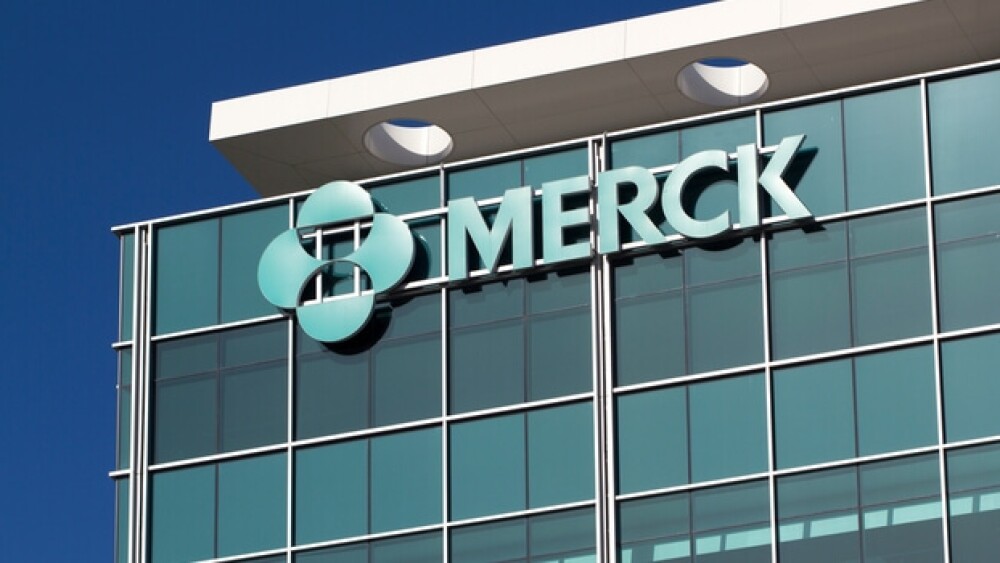Merck acquired OncoImmune and its COVID-19 therapeutic candidate CD24Fc for $425 million in upfront cash two months after the Phase III asset demonstrated efficacy during an interim analysis.
Tada Images/Shutterstock
Merck acquired Maryland-based OncoImmune and its COVID-19 therapeutic candidate CD24Fc for $425 million in upfront cash two months after the Phase III asset demonstrated efficacy during an interim analysis.
This morning, Merck, through a subsidiary, announced it will acquire all outstanding shares of privately-held OncoImmune. In addition to the upfront payment, OncoImmune shareholders will be eligible to receive sales-based payments and payments contingent on the successful achievement of certain regulatory milestones.
Roger Perlmutter, president of Merck Research Laboratories, who announced his retirement from the company last month, pointed to CD24Fc as a potential therapeutic option for the ongoing battle against the global COVID-19 pandemic, which has infected more than 58 million people across the globe and more than 12 million in the United States.
“Recent clinical investigations support the view that CD24Fc may provide benefit beyond standard of care therapy for COVID-19 patients requiring oxygen support, and hence will represent an important addition to the Merck pipeline of investigational medicines and vaccines designed to address the COVID-19 pandemic,” Perlmutter said in a statement.
Yang Liu, co-founder and chief executive officer of OncoImmune, pointed to Merck’s manufacturing and distribution prowess as a means of potentially accelerating the use of CD24Fc should it receive authorization. In September, OncoImmune released interim data from the Phase III study of CD24Fc that showed patients with severe or critical COVID-19 treated with a single dose of CD24Fc showed a 60% higher probability of improvement in clinical status, as defined by the protocol, compared to placebo. The risk of death or respiratory failure was reduced by more than 50%.
CD24Fc, which has been subbed Saccovid, is an investigational immunomodulator targeting the innate immune system. Before being aimed at COVID-19, the asset was being studied for the prevention of graft versus host disease (GVHD) following hematopoietic stem cell transplantation in leukemia patients. A pivotal Phase III clinical trial for prophylaxis of GVHD has been initiated nationwide.
“Outstanding work by the OncoImmune team has provided compelling evidence regarding the use of CD24Fc in patients with severe and critical COVID-19 in our Phase III Trial. We look forward to working with the scientists and manufacturing engineers at Merck as well as regulators as we seek to accelerate the global development of this potentially important therapy,” Liu said in a statement.
For Merck, the acquisition of OncoImmune will bolster the pharma giant’s efforts to combat the pandemic. Merck jumped into the vaccine development program with its May acquisition of Austria-based Themis. Also in May, Merck and Florida-based Ridgeback Therapeutics teamed up to develop MK-4482 (formerly known as EIDD-2801). MK-4482 is an orally available antiviral candidate for the treatment of COVID-19. In preclinical studies, MK-4482 demonstrated antiviral properties against SARS-CoV-2.
OncoImmune’s CD24Fc will fall under the Merck umbrella, but other assets belonging to the Maryland-based company will be spun out into a new company that will be owned by the existing shareholders of OncoImmune. In connection with the closing of the acquisition, Merck will invest $50 million and become a minority shareholder, in the new entity.
For Merck, and the outgoing Perlmutter, the acquisition of OncoImmune follows hard on the heels of its $2.75 billion deal for VelosBio and that company’s promising cancer therapy that targets receptor tyrosine kinase-like orphan receptor 1 (ROR1) in both hematological and solid tumors. VelosBio’s lead investigational candidate is VLS-101, an antibody-drug conjugate (ADC) targeting ROR1 that is currently being evaluated in a Phase I and a Phase II clinical trial for the treatment of patients with hematologic malignancies and solid tumors, respectively.
Featured Jobs on BioSpace





